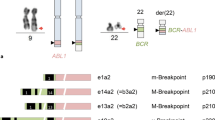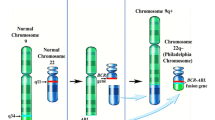Abstract.
Since it was first recognized, chronic myeloid leukemia (CML) has always represented a unique model to understand the molecular mechanisms underlying the onset and progression of a leukemic process. CML was the first recognized form of cancer to have a strong association with a recurrent chromosomal abnormality, the t(9;22) translocation, which generates the so-called Philadelphia (Ph)-chromosome. Twenty years later, this abnormality was shown to cover a specific molecular defect, a hybrid BCR-ABL gene, strongly implicated in the pathogenesis of the disease through the production of a protein with a constitutive tyrosine-kinase activity. Although we still lack a complete definition of all the transformation pathways activated by Bcr-Abl, the recent introduction into clinical practice of tyrosine kinase inhibitor represents a major breakthrough to the management of CML and, furthermore, promises to usher in molecularly targeted therapy for other types of leukemia, lymphoma and cancer.
Similar content being viewed by others
Author information
Authors and Affiliations
Corresponding author
Rights and permissions
About this article
Cite this article
Saglio, G., Cilloni, D. Oncogenic protein tyrosine kinases. CMLS, Cell. Mol. Life Sci. 61, 2897–2911 (2004). https://doi.org/10.1007/s00018-004-4271-0
Issue Date:
DOI: https://doi.org/10.1007/s00018-004-4271-0




